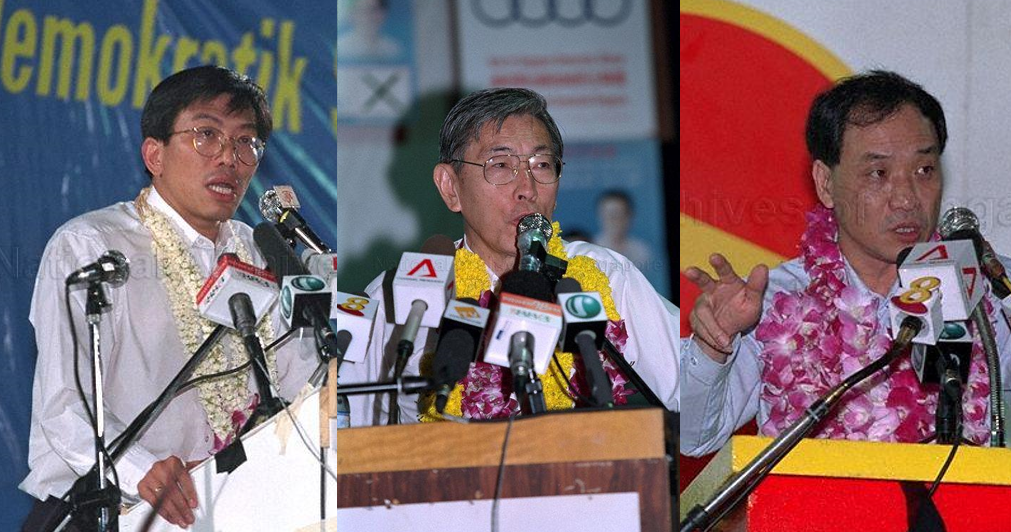The First Wave: JBJ, Chiam & The Opposition in Singapore is a study of the first generation of Singapore's post-independence opposition.
Written by Loke Hoe Yeong, an associate fellow at the European Union Centre and biographer of veteran opposition politician Chiam See Tong, the book details the initial entry of the opposition to Parliament in the 1980s and the early 1990s, and the subsequent divisions within their own parties.
The First Wave is published by Epigram books and is available here.
Here, we produce an excerpt from the book on Chiam's Singapore Democratic Alliance, and his endeavour to get the Workers' Party and Singapore Democratic Party to join the coalition.
***
Chiam See Tong joined the Singapore People's Party (SPP) in 1994, and later became the chairman of the Singapore Democratic Alliance (SDA).
The SDA, formed in 2001, was a coalition involving the SPP and three other opposition parties in Singapore -- the National Solidarity Party (NSP), the Singapore Justice Party (SJP) and Singapore Malay National Organisation (PKMS).
Chiam had approached the Workers' Party (WP) to join him, an event that coincided with Low Thia Khiang becoming the secretary-general of the WP.
He also approached his former party, the Singapore Democratic Party (SDP).
Low Thia Khiang becomes WP sec-gen
In May 2001, another development in the opposition landscape took place — after almost 10 years as an MP, Low Thia Khiang assumed the position of secretary-general of the Workers’ Party, taking over from Jeyaretnam.
It was reported that Jeyaretnam had agreed to step down to “let new blood take over the leadership”, allowing Low to be elected to the position unopposed.
Subsequent rumblings suggested that the leadership transition was not as smooth as had been publicly portrayed, when some disenchanted party cadres took to the platform of Think Centre, an NGO, to question the legality of the party conference during which Low had been elected leader.
Think Centre had been involved in a “Save JBJ” campaign to raise funds to settle Jeyaretnam’s debts of almost S$550,000 arising from defamation suits against PAP leaders so that Jeyaretnam could qualify to stand as a candidate again at the upcoming general election, but received far less than their targeted amount.
Jeyaretnam and his supporters wanted the party to also raise funds to settle his debts. But Jeyaretnam, realising that the majority of the party cadres were not in favour of that, decided the most decent thing for him to do was to step down.
“I knew, even before 2001, that they weren’t prepared to go along with me and they found me a liability,” Jeyaretnam said.
Since then, Jeyaretnam had been clearly disgruntled with the new developments in the Workers’ Party and with the opposition movement as a whole.
As the opposition parties were preparing for the 2006 general election, he accused both Chiam and Low of not being daring enough to challenge and change Singapore’s political system.
Low’s ascent to the leadership of the Workers’ Party marked a fresh start, a development that Chiam certainly tried to tap on.
Chee felt that there would be a "clash of personalities"
Chiam sent out invitations to the SDP and the Workers’ Party to join his fledgling alliance, telling them that “Singaporeans do not want small parties but a strong group against the PAP”.
But his overtures were not met with commensurate enthusiasm.
The SDP predictably declined Chiam’s invitation. “Not at this stage,” Chee said. “We feel that the beliefs and policies of the party can be more effectively communicated if it remains as it is.”
Naturally, the elephant in the room — his clash with Chiam in the SDP in 1993 — was raised, to which Chee responded, “I don’t think the clash of personalities should influence the course of opposition politics in Singapore.”
WP seriously considered joining Chiam's coalition, but eventually decided not to
The Workers’ Party also declined.
Low, in a 2016 interview, said that he had been under “immense pressure” in 2001 to join the SDA. He decided, however, that it was more important to build up the Workers’ Party and preserve its legacy.
He did not feel that his party had reached a stage where it could contribute to an alliance.
Clearly, as he admitted, he also feared a repeat of the 1997 election, when the PAP had used the internal rifts within the SDP to “tar all opposition parties with the same brush”.
As a result, the opposition lost the ground that it had gained in 1991, although Low was immune to this phenomenon in Hougang.
This was why the Workers’ Party had decided after the 1997 election to “forge its own path”, he said.
The CEC of the Workers’ Party had apparently pondered deeply the invitation to join the SDA.
Low was reportedly insistent that the Workers’ Party had to have control over its alliance partners and how they acted, which would imply that he was fine working with Chiam but found some of the other constituent parties of the SDA questionable.
Even Eric Tan’s clique in the Workers’ Party, which was involved with the discussions behind the formation of the SDA ultimately decided against the idea of joining the SDA on the principle that a party had to have “consistent branding.”
The SDP and the Workers’ Party were each larger in membership size than the parties that joined the SDA — with the possible exception of PKMS — and also stood above those smaller parties in stature by virtue of having had elected MPs from among their ranks.
They understandably did not see the need for collective strength as urgently.
Top photo via National Archives of Singapore.
If you like what you read, follow us on Facebook, Instagram, Twitter and Telegram to get the latest updates.
